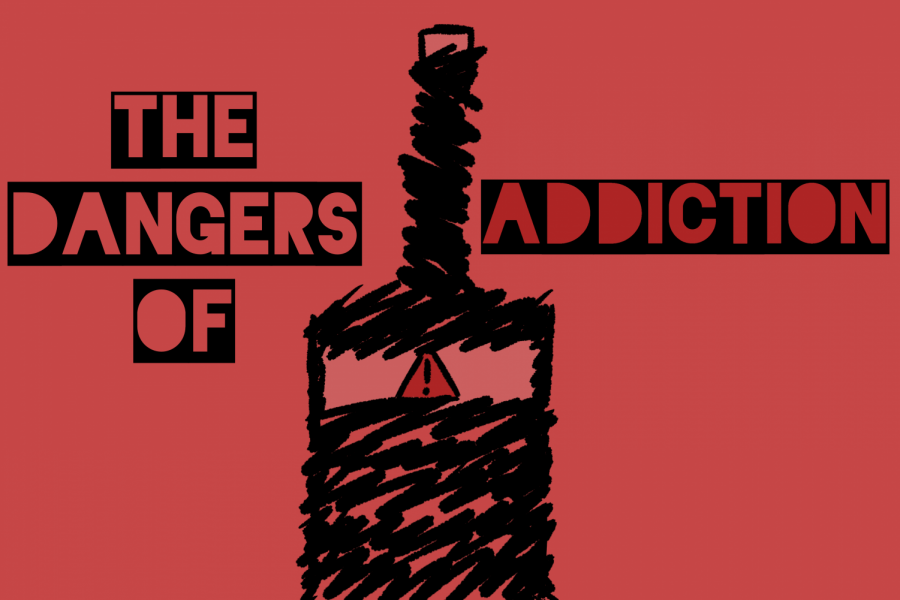Ansley’s Column: Thoughts on addiction
The following is part of a monthly column written by Senior Writer Ansley Morris.
Original art by staff artist, Evanthia Stirou, displaying the dangers of addiction.
The definition of the word “addiction” is the fact or condition of being addicted to a particular substance, thing, or activity. But, there’s so much more behind the term ‘addiction’ than just the Merriam Webster’s definition. At one point or another in our lives, we all become addicted to something.
Whether you’re an avid athlete addicted to becoming the best player you can be at your sport, or an actor who’s deeply committed to memorizing every line and perfecting every facial expression, or you become addicted to a substance to distract yourself from everything else, addiction always leads back to wanting to escape from something or someone. But just how we decide to cope with all the struggles we may have, is where we all differ.
For example, an athlete might throw herself into practicing more to avoid issues at home (or just not wanting to do their homework). And the same could be said for any other after school activity or hobby.
But, more common than not, the word “addiction” almost immediately traces back to the negative world of substance abuse. Unfortunately, a lot of young adults easily slip into dangerous habits, whether it be drinking, smoking, or drugs. Especially if you’re going through a rough patch in your life at that time, the appeal of using something seemingly harmless to take that feeling away is very tempting. But, that solution is only temporary whereas the effects of the substance could very likely be permanent.
And it may be surprising just to see how common this all really is. According to American Addiction Centers, 1 in 11 young adults are binge drinkers and 1 in 7 young adults have a substance use disorder.
Depending upon the person and his/her genetics, just using particular substances one time can get you hooked. As we grow up, you can start to tell who may or may not have an addiction-prone personality, especially if that person may start to make some bad choices down the road. This could be due to that person’s overall emotional state at the time or it really could be due to genetics.
When someone becomes addicted to something, the problem isn’t always noticeable to them. Often, the people around them can easily see something isn’t right. According to Psychology Today, addiction affects the brain’s executive functions which means people who develop addictions may not be aware that their behavior is causing problems for themselves and others. And they certainly may struggle to make the right decisions.
While the word addiction usually brings to mind to substance abuse, that’s certainly not the case for everyone. Whether we realize it or not, we’re all addicted to something; whether it be our technology, watching Netflix, working out or training for a sport, or even baking. The difference between having a hobby and being addicted to it really depends on how you perceive it and how extreme it develops.
More common than not, when you become addicted to something, it’s a level or two past being a habit. It’s like the next step up, but much more unhealthy, often deadly.
When a habit turns into an addiction, there’s usually more behind the reasoning for it than just really enjoying doing that certain activity. Becoming addicted to something and having such a strong dependency upon it can easily trail back to other underlying issues in other areas in someone’s life. For example, if you’re trying to avoid issues with friends at school, you may throw yourself into out of school activities and clubs. But if you become too obsessed with all these new activities, you could easily turn this harmless hobby into an overwhelming obsession.
No matter what it may be, an obsession or addiction to something is unhealthy for the human body and brain. According to JourneyPure, it takes an average of about 66 days to form a habit. That’s just over two months and in the grand scheme of things, it’s really not long at all.
The brain has a way of tricking you into thinking that harmful substances or activities are beneficial for you so that a sense of alarm isn’t raised. More commonly than not, it takes someone on the outside to help you realize that you may be addicted to something as there’s a cloud of denial around most people who become overly dependent on someone or something.
If you recognize unhealthy, addiction-related tendencies in someone you know and want to help, make sure to not make it seem like they’re being interrogated when you talk to them and be sure to give off an overall feeling of compassion. Be ready to listen. Realizing you’re addicted to something that isn’t healthy for you isn’t the best feeling and could easily lead to a place of denial and ultimately dig you into a deeper hole than you’re already in.
Whether it’s substance abuse or just throwing yourself into an activity to avoid other ongoing issues in life, addiction can become scary and a very serious problem in anyone.
Anyone can fall victim to these dangers so it truly is important to make sure you’re always checking on your friends and loved ones, especially if you’re noticing potentially dangerous behavioral changes.
It’s important to understand that there’s a line between having a bad habit and a dangerous obsession. It can be crossed by anyone, and that’s why we all need to be aware of it.
If you or someone you know is struggling with addiction, just know that there’s always a light at the end of the tunnel that makes all the struggling worth it.
SAMSHA National Hotline – 1-800-662-4357

Ansley Morris is an Associate Editor in her third year on the Gauntlet staff. She’s a senior who enjoys going to the gym, cooking, and going out on the...

Evanthia is a third-year Creative Director on The Gauntlet. She is a senior here at Saint Stephen's and likes drawing, playing Genshin Impact, and hanging...
















































